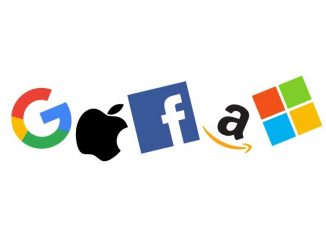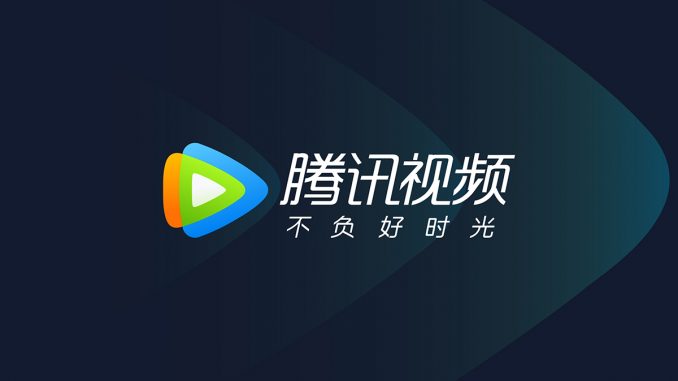
INTRODUCTION
As Internet technology continues to develop at a rapid pace in the 21st century, new media video platforms are rapidly emerging in China in the context of global digital reform. A new business model, the digital business model, has emerged. Chinese video sites, as represented by Tencent Video, have achieved leapfrog development on the path to platformization in recent years. Tencent Video has undergone restructuring and reform by its parent company, Tencent, and has moved forward to IP (Intellectual Property) ecological pan-entertainment through the promotion of new media marketing. The lucrative results of this new business model have accelerated, bringing huge profits to Tencent Video, and the benefits of platformization are becoming more prominent while providing audiences with increasingly rich content for video creation. This paper will examine the current development of Tencent Video in light of the political, economic, social, and technological environments, as well as its profit model as a platform business giant in the entertainment industry, and will conclude with an overview of the regulatory controversies of Tencent Video and its future market development concerns.
Key Words: Tencent Video; Streaming platform; Integrated video content
distribution; OTT TV; IP; Doki; Advertisement
1. What is Tencent Video?
Tencent Video is a Chinese video streaming website launched and launched by Tencent Holdings Group in April 2011(Tencent, n.d.). Tencent Video currently aggregates a massive amount of content resources such as popular movies and TV shows, variety and entertainment, sports events, and news and information, and provides users on different platforms and devices with a video entertainment experience with richer content and more high-definition and smooth viewing via various forms such as PC terminal, mobile terminal, and client-derived products(Tencent, n.d.).
Tencent Video’s strategy is centered on the creation of original content, as well as the support of original programmes, domestic dramas, micro movies, short film competitions, and support programmes(Li, Z. et al, 2016). Maintaining resource exclusivity while lowering costs. In addition, Tencent launched the international version of Tencent Video WeTV for the first time in 2018 due to licensing issues(Tencent, n.d.).
2. Industry Backgrounds of Tencent Video
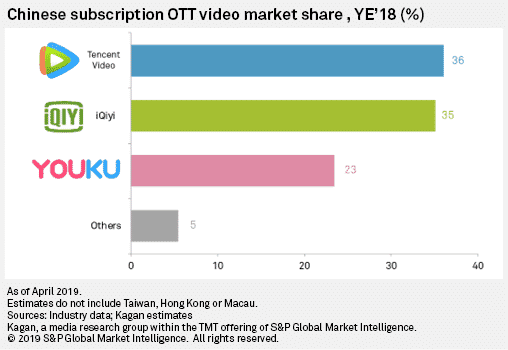
Following the 2012 smartphone explosion, Tencent Video followed the wind into the mobile side. Tencent video market share gradually rose in the following year, for later in 2016 Tencent infusion, the third quarter to become the first online video market share laid the foundation. Tencent video in China’s rival Youku video fell behind, market share was further eaten by Tencent video due to the endless IP creation, the Matthew effect became visible(Adkins, 2019). Doki, a Tencent video layout entertainment social ecosystem, was born in 2018(Global Times, 2020).
Analysis of Tencent Video’s Business Model Driven by Technology
3. Political Environment
3.1. The “Internet+” Action Plan in China
Premier Li Keqiang proposed the “Internet Plus” action plan, representing a new economic form, at the third session of China’s 12th National People’s Congress in 2015(CPGPRC, 2015). The media industry has further integrated and developed its business thinking by utilising “Internet+.” Tencent Video has gradually built a pan-entertainment and pan-knowledge business around user values based on “Internet+” to promote the development of the industrial Internet(Liao, 2020).
3.2. The Digital Economy Effect
- Tencent Video, Music, News and Online Reading are all part of Tencent’s digital economy business. Tencent topped the Forbes Global Digital Economy China list in the first half of 2018, with total revenue of $147.203 billion and the highest usage of video apps(Haoguan, 2019).
- The digital economy leads to an increase in Tencent’s paid video membership. In the internal environment, video products are oriented by the value of “content is king.” The political external environment, influenced by the continuous optimisation and maturation of China’s network environment from 4G to 5G, has increased the frequency of video content usage and, indirectly, users’ willingness to pay. Tencent Video had 62.59 million VIP members as of February 2018(Analysis易观, 2018).
4. WhatSystem Does Tencent Video Relies on to Generate its Own Profit?
Tencent Cloud is a type of public cloud that offers basic cloud computing services such as cloud servers, cloud databases, cloud storage, and CDN(Content Delivery Network), as well as industry solutions for a wide range of developers such as games, video, and mobile applications(Tencent Cloud, n.d.). Data in the age of big data is distinguished by massive quantification, value, and diversity.
Tencent Video offers a variety of services to users that are based on big data and cloud technology to process and thoroughly analyse data, and it is based on the user’s age, gender, geography, Internet scenarios, time, and content preferences.
5. The Interrelated Relationship between VIP Increasing Rate and the Idol Economy and the Digital Fans Economy
5.1. “Doki Circle”
The following is an example of one of the typical character portraits derived from Tencent Cloud System: User 1: Lisa, Tianjin, female, 32 years old, freelancer purpose of use: chasing stars + watching a variety show.
Use scenario: Lisa has more free time and likes to chase stars. Tencent Video Doki held several “heartbeat” activities in 2018, so Lisa joined the list group and sent heartbeats on Doki for several weeks for her idol, so Lisa’s idol gained attention and recognition. Generally, she also likes to watch Chuang2021, a phenomenal 2021 Tencent Video original hit variety show(Daxue Consulting, 2021).
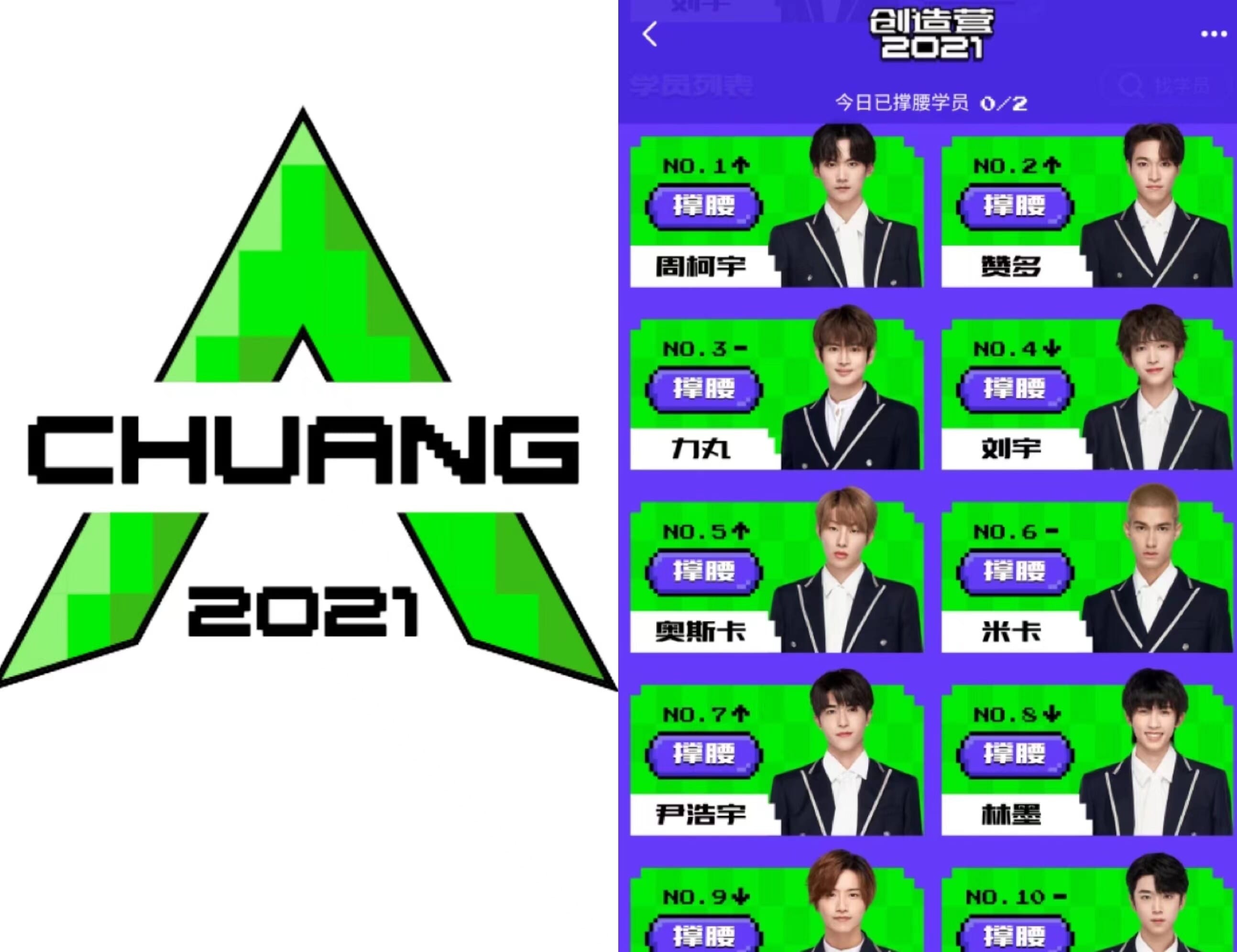
https://v.qq.com/detail/8/89244.html
Nick Srnicek mentioned in his book Platform Capitalism(2017) that platform capitalism’s heart the heart of platform capitalism lies in extracting more data, and by comprehensively profiling users, large platforms can further broaden their scope of business and become monopolies, while machine learning fed by massive amounts of information means that monopolistic platforms’ AI technology enables them to pursue More profits and power.
Tencent Video has its celebrity community section because the community is the best way to increase user stickiness and loyalty. Tencent Video, backed by the powerful capital Tencent Holdings, strongly invites stars to its community (Doki circle), which carries a certain amount of traffic and topics and perfectly matches the rice circle culture that has emerged in recent years, reducing the steps for people to interact with their favorite stars while watching dramas. For example, “like, comment, pop-up, favorite” has become an unspoken agreement between creators and viewers.
5.2. VIP Advantages
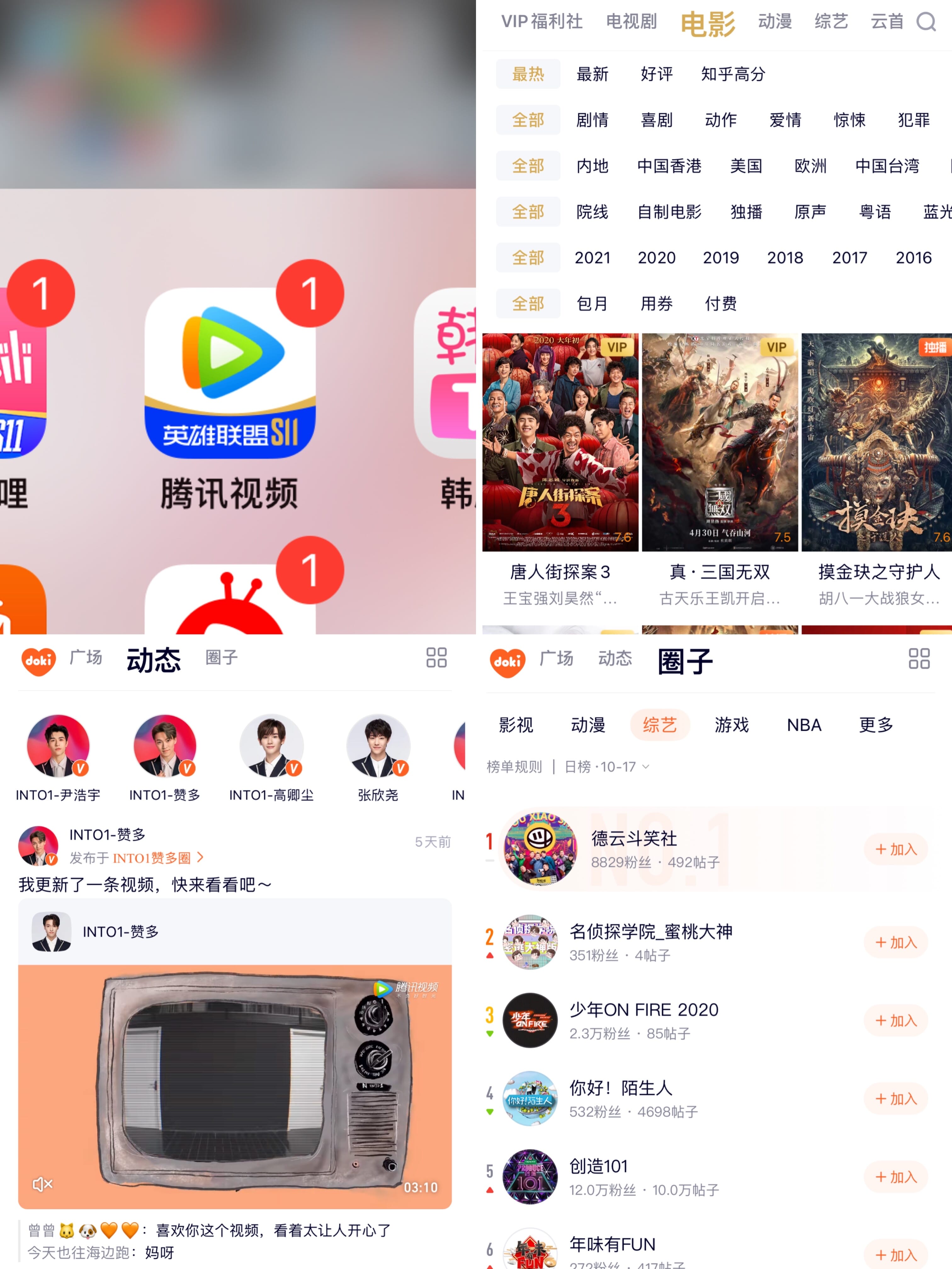
VIP members receive exclusive limited free prop gifts for live interaction during the interactive live broadcast of idols. According to their VIP level, they can give their love beans to play the list, and there are replacement star theme privileges.
Live broadcast privileges include paid live concerts, live star meetups, and so on. Tencent Video VIP members receive discounts on film purchases or even free viewing. Drag the progress bar at any time to view the live broadcast history, live multi-view camera position, and live broadcast without queuing during the live broadcast process.
In the digital media environment, Tencent Video differentiates itself from the competition by providing users with personalised services and value-added VIP membership services to gain the deep trust of “fans” and boost the platform’s economic development.
6. Advertising Profits
“Goose advertising” refers to the “content + data + new play” advertising model used by Tencent Video in its self-produced dramas, which caters to the current audience’s aesthetic trend while also creating a new economic profit model.
7. Video E-Commerce Earnings
E-Commerce profit is a pop-up advertisement that appears during the broadcast of a video and is characterised by buying while watching, and users can directly click on the link to purchase the same item. The E-Commerce ads are instant, saving viewers the time of searching for the same item in the show. The emergence of the E-Commerce business will become an essential part of the website ecosystem, transforming the video website into an ecosystem(Flare, 2021, p. 46)
Concerns and Self-Regulations
8. The Temporary Canceling of Video On Demand(VOD) Service

On October 4, 2021, major Chinese video streaming platforms, including Tencent Video, announced that they would discontinue the practise of charging fees for early access to TV show episodes before they are available to other members and the general public. Because of this value-added service, VIP members must pay extra to unlock the yet-to-be-broadcast content in advance, and VIP users can only buy on an episode-by-episode basis (Tencent Video VIP, 2021).
9. Requirement of Conducting A More Thorough Review of Advertising Content.
The goal of setting ads on a streaming media platform is to make money, however, and it is more important to consider the user experience while making money. To prevent the loss of loyal users, which could result in incalculable losses, Tencent Video should strengthen the review of advertisers, forms, and contents, and balance commercialization with the characteristics of the streaming media platform itself.
CONCLUSION
The prerequisite for streaming platform integrated video content distribution to achieve consistent growth against the backdrop of the new era is to innovate the business model, change the single expression form of traditional TV and advertising, and limit the broadcast of low-quality advertisements. In conjunction with the popular new media broadcast forms. Tencent Video needs to strive to improve the quality of TV and advertising content while strengthening the sense of independent innovation and fully reflecting the characteristics of the times, in order to achieve the good development of TV video streaming website platformization. Tencent Video dominance in the Chinese online video market is both successful and unparalleled in terms of VIP subscriber growth, services, content, and revenue.
SID500079780 [Words Count:1393, excluding titles and picture captions]

This work is licensed under a Creative Commons Attribution 4.0 International License.
References
· Adkins, T. (2019, July 3). State of Chinese OTT video: Subscription. Accelerating Progress | S&P Global. https://www.spglobal.com/marketintelligence/en/news-insights/research/state-of-chinese-ott-video-subscription
· Analysis易观. (2018, August 29). 2018中国数字用户个人会员付费需求分析. 易观分析-数据驱动精益成长. https://www.analysys.cn/article/detail/20018831
· Central People’s Government of the People’s Republic of China. (2015, June 24). 李克强主持召开国务院常务会议(2015年6月24日)_李克强_中国政府网. 中国政府网_中央人民政府门户网站. https://www.gov.cn/guowuyuan/2015-06/24/content_2883516.htm
· Daxue Consulting. (2021, June 4). China’s idol economy: How the Chinese fan culture is shaping entertainment and marketing. Daxue Consulting – Market Research China. https://daxueconsulting.com/china-idol-economy/
· Flare. (2021). TikTok, Tencent Video, iQiyi among world’s top-earning apps. Knowledge Bylanes. https://sydney.primo.exlibrisgroup.com/discovery/fulldisplay?docid=cdi_gale_infotrac_669066310&context=PC&vid=61USYD_INST:sydney&lang=en&search_scope=MyInst_and_CI&adaptor=Primo%20Central&tab=Everything&query=any,contains,Tencent%20Video&mode=basic&offset=0
· Global Times. (2020, October 28). 2021腾讯视频内容版图亮相. IFENG. https://ishare.ifeng.com/c/s/v002Px8Qvdz9T0SReoUPdliKTg099YKYS3pu8hpMO-_qP-_gI__
· Haoguan. (2019, October 12). 腾讯连续入选福布斯全球数字经济百强榜. Tencent Technology. https://tech.qq.com/a/20191012/008004.htm
· Jancreation. (2021, April 6). 腾讯视频品牌VI系统及品牌片头出品动画升级. 减艺_独立Branding厂牌,造时代先锋品牌. https://www.jancreation.cn/motion/2020/0924/55.html
· Liao, R. (2020, May 12). Tencent music bets on China’s crowded audio content space – TechCrunch. TechCrunch. https://techcrunch.com/2020/05/11/tencent-music-bets-on-chinas-crowded-podcasting-space/
· Li, Z., Dai, Y., Chen, G., & Liu, Y. (2016). Content Distribution for Mobile Internet: A Cloud-based Approach (1st ed. 2016.). Springer Singapore. https://doi.org/10.1007/978-981-10-1463-5
· Srnicek, N. (2017, May 23). Platform Capitalism. Google Books. https://books.google.com.hk/books/about/Platform_Capitalism.html?id=2HdNDwAAQBAJ&printsec=frontcover&source=kp_read_button&hl=en&redir_esc=y#v=onepage&q&f=false
· Tencent Cloud. (n.d.). Tencent cloud. https://intl.cloud.tencent.com/zh/
· Tencent Video VIP. (2021, October 4). Declaration of Tencent Video VIP. Sina Website. https://m.weibo.cn/status/4688584416428779
· Tencent. (n.d.). 腾讯公司. Tencent 腾讯. https://www.tencent.com/zh-cn/about.html#about-con-3


